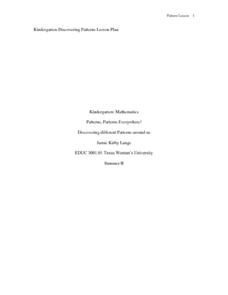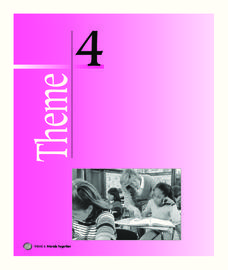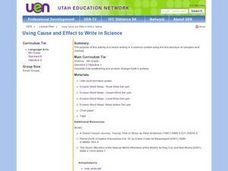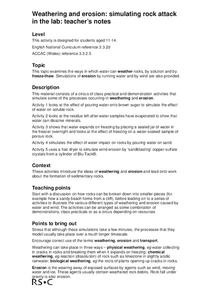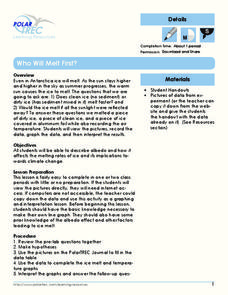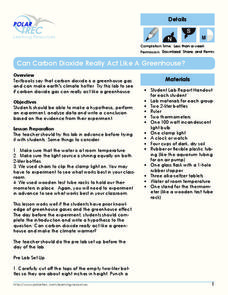Texas Woman’s University
Patterns, Patterns Everywhere!
Not only is pattern recognition an essential skill for young children to develop, it's also a lot of fun to teach! Over the course of this lesson, class members participate in shared readings, perform small group activities, and complete...
Education Bureau of Hong Kong
Evaluating Casual Claims
Responsible decision making relies on the ability to a recognize, analyze, and evaluate claims. The worksheets and activities in this 32-page packet teach learners how to distinguish among opinions, reasoned arguments, facts, and logical...
Houghton Mifflin Harcourt
Friends Together: English Language Development Lessons (Theme 4)
Enjoy this thematic friendship unit compiled with ESL lessons to develop strong language development while listening, speaking, looking, and moving. Class members participate in activities covering topics like making friends, asking for...
Curated OER
Using Cause and Effect to Write in Science
Fifth graders brainstorm processes or forces that cause Earth's surface to be changed.
Curated OER
Global Warming: The Greenhouse Effect Debate
Young scholars gather information about the Greenhouse Effect and participate in a debate about the merits of this theory on both sides. They explore the Greenhouse Effect, and its possible long-term effects, from a variety of resources.
Curated OER
Exploring the Effects of Weather
Fifth graders brainstorm different types of extreme weather and their effects on the environment and share lists with class. They research the effects on the environment through the use of the World Wide Web, Microsoft Encarta, and...
Curated OER
Trembling, Spewing Earth: Impacts on Human Activity
Seventh graders study to identify patterns in earthquake activity and impacts on human behavior. They also develop plans to cope with such natural disasters.
Curated OER
Vietnam 1945 - 1975 :The 10,000 Day War
Each phase of the Vietnam War is fully developed and defined in terms of political cause and effect and social action. Phase one covers the onset of the war in 1945 through the French defeat at Dienbienphu. Phase two discusses American...
Calvin Crest Outdoor School
Survival
Equip young campers with important survival knowledge with a set of engaging lessons. Teammates work together to complete three outdoor activities, which include building a shelter, starting a campfire, and finding directions in the...
Curated OER
The Great Depression and Everyday Life
Examine everyday life during the Great Depression, as well as the effects if the Depression on American population, society, and economy. Learners write who, what, where, when, and why summaries of a person who relocated to California...
Curated OER
Persecution
Eleventh graders determine the causes and effects of persecution. They read The Crucible by Arthur Miller. They analyze the historical significance of persecution. They use technology to research types of persecution.
Federal Reserve Bank
The Fed's Role in Making and Setting Monetary Policy: Part 1
How does inflation affect the economy, and how can effective monetary policy by the Federal Reserve help control inflation? With the Fisher equation and analysis of annual CPI rates during the 1970s and early 1980s, your class members...
Curated OER
Climate Change
Rising sea levels, strong storms, melting ice ... who or what is to blame? Scholars browse the website in preparation for a class discussion or debate about whether human activity is causing climate change. They gain a balanced...
Curated OER
Growth of Florida's Railroads
Based on an examination of Florida's railroad system, this multi-step lesson addresses FCAT requirements specific to Florida. After reading a passage, scholars use a map of the state to label railroad systems. They describe the goods...
Royal Society of Chemistry
Weathering and Erosion: Simulating Rock Attack in the Lab
Into each life some rain must fall, but how can that change rocks? Young geologists' understanding of weathering and erosion increases throughout the activities. The lesson includes five short activities to be completed over two class days.
It's About Time
Run and Jump
Has your class wondered how fast a human could run or how high they are capable of jumping? Help them understand these concepts as they explore acceleration and use an accelerometer to make semiquantitative measurements of acceleration...
Kenan
Respiratory System
Explore the respiratory system with a model. First, pupils build a set of lungs to experiment how they inflate and deflate. Then, they delve deeper into the topic with a web quest to discover new information about the nose, trachea, and...
Virginia Department of Education
The Germ Theory and Koch’s Postulates
Explore the history of cholera and its effect on society with your biology class. Young biologists will then proceed to grow their own germs, prepared from live cultures, and follow the steps of the scientific method to generate data....
Curated OER
Inventions Over Time
Explore the inventions of the past with a project on ancient tools. After reading an article about hunting during the Archaic period, the Late Prehistoric period, and the Historic period, kids fill in a cause-and-effect chart about the...
It's About Time
Circular Motion
Lead your class in this exciting activity to learn more about motion and its importance. Pupils learn about a centripetal and why it is required to maintain a constant speed in a circulating moving mass. They apply the equation for...
Hampton-Brown
From "First Crossing"
Young scholars look closely at four tales taken from the collection of short stories, First Crossing edited by Donald R. Galloby. While examining the life of four teenagers and the lives they lead as U.S. immigrants, your enthusiastic...
Polar Trec
Who Will Melt First?
If the Greenland ice sheet melted, sea levels would rise by about 20 ft; if the Antarctic ice sheet melted, sea levels would rise by 200 ft. Scholars explore ice melting through the analysis of different ice samples, clean and dirty ice....
Virginia Department of Education
Genetic Variation and Mutations
Young scientists demonstrate their creativity while completing several activities, to assess genetic variations and mutations. Instructors provide a list of options and scientists choose to write a comic strip, create a book, construct a...
Polar Trec
Can Carbon Dioxide Act Like a Greenhouse Gas?
Ninety-seven percent of scientists who study climate agree that human activity is warming the planet. Learners explore carbon dioxide as a greenhouse gas, a gas causing this warming, through a hands-on experiment. Once complete, they...


